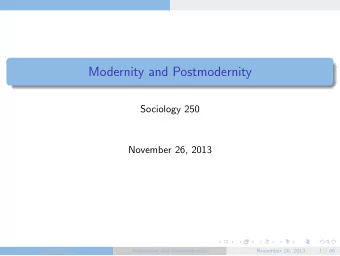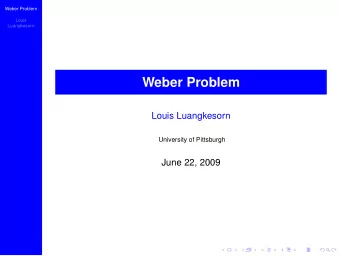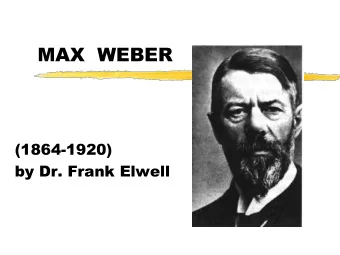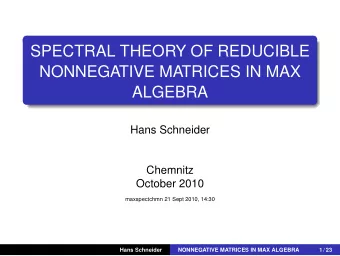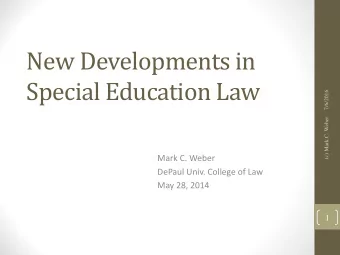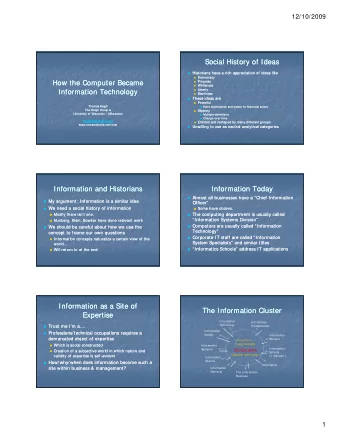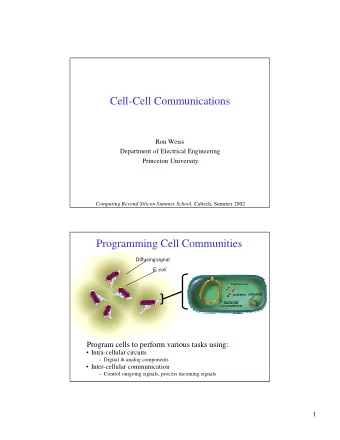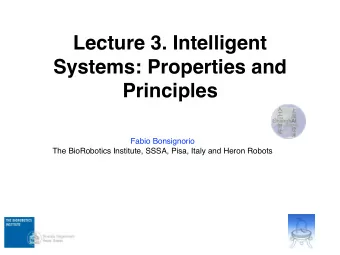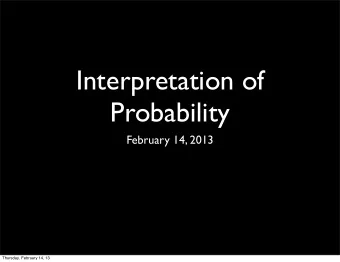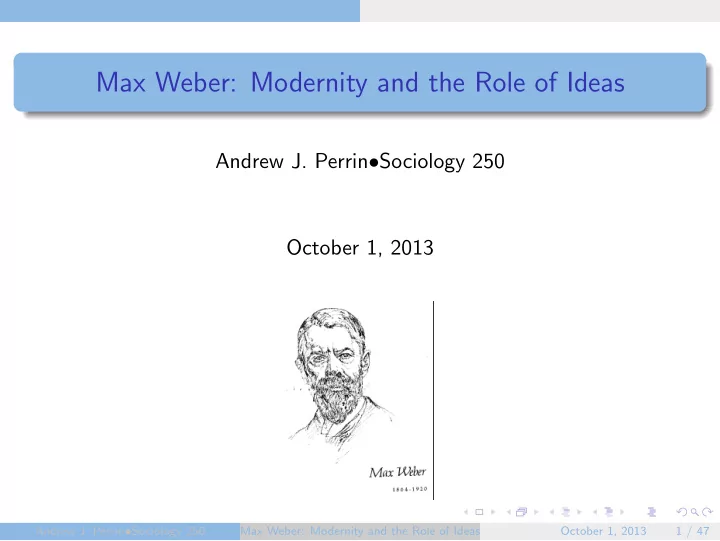
Max Weber: Modernity and the Role of Ideas Andrew J. Perrin - PowerPoint PPT Presentation
Max Weber: Modernity and the Role of Ideas Andrew J. Perrin Sociology 250 October 1, 2013 Andrew J. Perrin Sociology 250 Max Weber: Modernity and the Role of Ideas October 1, 2013 1 / 47 1 Briefing on the midterm exam 2 Weber: A Short
Max Weber: Modernity and the Role of Ideas Andrew J. Perrin • Sociology 250 October 1, 2013 Andrew J. Perrin • Sociology 250 Max Weber: Modernity and the Role of Ideas October 1, 2013 1 / 47
1 Briefing on the midterm exam 2 Weber: A Short Introduction 3 Marx and Weber: An Imagined Dialogue 4 Graded papers available on Sakai as of 1:30 today Andrew J. Perrin • Sociology 250 Max Weber: Modernity and the Role of Ideas October 1, 2013 2 / 47
Max Weber: A Short Life Story Born 1864, Erfurt, Germany 1904 Emerges and tours USA, including trip to Educated Heidelberg & Berlin visit relatives in Mt. Career Major intellectual Airy force in intellectual 1905–20 Writes most of his and political circles important work 1897 Family quarrel leads to Died June 14, 1920, nervous breakdown pneumonia Andrew J. Perrin • Sociology 250 Max Weber: Modernity and the Role of Ideas October 1, 2013 3 / 47
Big Questions in Weber When are ideas important in history? How are modern societies organized? How do people learn to be capitalist individuals? Andrew J. Perrin • Sociology 250 Max Weber: Modernity and the Role of Ideas October 1, 2013 4 / 47
Verstehen The proper role of social science Weber: Verstehen (“understanding”) of social action is the proper goal of social science Contrast to Marx’s parsimony Social Action : anything done by anyone that is not completely instinctual or natural Andrew J. Perrin • Sociology 250 Max Weber: Modernity and the Role of Ideas October 1, 2013 5 / 47
The Importance of Ideas The Protestant Ethic and the Spirit of Capitalism Why do people work harder than they have to for survival? Rooted in a system of beliefs: Protestant Asceticism This logic leads followers to care deeply about material success Capitalist logic thus takes hold Andrew J. Perrin • Sociology 250 Max Weber: Modernity and the Role of Ideas October 1, 2013 6 / 47
The Protestant Ethic Predestination : certain people are destined for heaven or hell, even before their birth Therefore, what those people do during life doesn’t impact their eventual destinations BUT . . . they are interested in displaying saved status to others They therefore work for worldly success as a measure of being in God’s favor Andrew J. Perrin • Sociology 250 Max Weber: Modernity and the Role of Ideas October 1, 2013 7 / 47
The Persistence of Ideas Ideas’ impacts can persist long after the ideas are no longer credible That’s why ideas are so important in history: Yes, they arise from material life, but they have a life of their own Andrew J. Perrin • Sociology 250 Max Weber: Modernity and the Role of Ideas October 1, 2013 8 / 47
Weber: The Character of Modern Society Bureaucracy Rules, offices, files Rationalization/routinization Wertrationalit¨ at Zweckrationalit¨ qt ⇒ Value rationality Pure rationality ⇒ “Disenchantment of the World” Andrew J. Perrin • Sociology 250 Max Weber: Modernity and the Role of Ideas October 1, 2013 9 / 47
Marx vs. Weber: Conflicting Worldviews Andrew J. Perrin • Sociology 250 Max Weber: Modernity and the Role of Ideas October 1, 2013 10 / 47
Die Geschichte aller bisherigen Gesellschaft ist die Geschichte von Klassenk¨ ampfen. The history of all hitherto existing society is the history of class struggle. Marx and Engels, Manifest der Kommunistischen Partei 1847–49 Andrew J. Perrin • Sociology 250 Max Weber: Modernity and the Role of Ideas October 1, 2013 11 / 47
. . . pseudowissenschaftlichem Operieren mit dem Begriff der “Klasse”, des “Klasseninteresses” f¨ uhren, die heut vielfach ublich ist. . . da ß zwar der Einzelne sich ¨ ¨ uber seine Interessen irren k¨ onne, die “Klasse” ¨ uber die ihrigen aber “unfehlbar” sei. . . . pseudo-scientific operation with. . . ‘class’ and ‘class interests’. . . which has found its most classic expression in the statement of a talented author, that the individual may be in error concerning his interests but that the ‘class’ is ‘infallible’ about its interests. Weber, Wirtschaft und Gesellschaft , T¨ ubingen 1922, 633–4 Andrew J. Perrin • Sociology 250 Max Weber: Modernity and the Role of Ideas October 1, 2013 12 / 47
Marx and Weber Andrew J. Perrin • Sociology 250 Max Weber: Modernity and the Role of Ideas October 1, 2013 13 / 47
[Throughout history] Freeman and slave, patrician and plebeian, lord and serf, guild-master and journeyman, in a word, oppressor and oppressed, stood in constant opposition to one another, carried on an uninterrupted, now hidden, now open fight, a fight that each time ended, either in a revolutionary re-constitution of society at large, or in the common ruin of the contending classes. Andrew J. Perrin • Sociology 250 Max Weber: Modernity and the Role of Ideas October 1, 2013 14 / 47
Setting Up the Great Clash [Under capitalism] the Bourgeoisie. . . has simplified the class antagonisms: Society as a whole is more and more splitting up into two great hostile camps, into two classes directly facing each other: Bourgeoisie and Proletariat. Andrew J. Perrin • Sociology 250 Max Weber: Modernity and the Role of Ideas October 1, 2013 15 / 47
. . . religions [are] snake skins which have been cast off by history . Andrew J. Perrin • Sociology 250 Max Weber: Modernity and the Role of Ideas October 1, 2013 16 / 47
Religion is. . . the opium of the people. Andrew J. Perrin • Sociology 250 Max Weber: Modernity and the Role of Ideas October 1, 2013 17 / 47
. . . a religious man is said to make himself ready for the reception of the all-important grasp of the meaning of the world and of his own existence. Andrew J. Perrin • Sociology 250 Max Weber: Modernity and the Role of Ideas October 1, 2013 18 / 47
Social life is essentially practical . Material force can only be overthrown by material force; but theory itself becomes a material force when it has seized the masses. Andrew J. Perrin • Sociology 250 Max Weber: Modernity and the Role of Ideas October 1, 2013 19 / 47
Criticism has plucked the imaginary flowers from the chain, not in order that man shall bear the chain without caprice or consolation but so that he shall cast off the chain and pluck the living flower. Andrew J. Perrin • Sociology 250 Max Weber: Modernity and the Role of Ideas October 1, 2013 20 / 47
very frequently the ‘world images’ that have been created by ‘ideas’ have, like switchmen, determined the tracks along which action has been pushed by the dynamic of interest. Andrew J. Perrin • Sociology 250 Max Weber: Modernity and the Role of Ideas October 1, 2013 21 / 47
The tradition of all the dead generations weighs like a nightmare on the brain of the living. Andrew J. Perrin • Sociology 250 Max Weber: Modernity and the Role of Ideas October 1, 2013 22 / 47
A Negro is a Negro. he only becomes a slave in certain relations. A cotton-spinning jenny is a machine for spinning cotton. It becomes capital only in certain relations. Torn from these relationships it is no more capital than gold in itself is money or sugar the price of sugar. Andrew J. Perrin • Sociology 250 Max Weber: Modernity and the Role of Ideas October 1, 2013 23 / 47
. . . religions created by intellectuals and meant to be rational have been strongly exposed to the imperative of consistency. The effect of the ratio [“reason”], especially of a teleological deduction of practical postulates, is in some way, and often very strongly noticeable among all religious ethics. Andrew J. Perrin • Sociology 250 Max Weber: Modernity and the Role of Ideas October 1, 2013 24 / 47
labour produces for the rich wonderful things–but for the worker it produces privation. It produces palaces–but for the worker, hovels. It produces beauty–but for the worker, deformity. It replaces labour by machines–but some of the workers it throws back to a barbarous type of labour, and the other workers it turns into machines. It produces intelligence–but for the worker idiocy, cretinism. Andrew J. Perrin • Sociology 250 Max Weber: Modernity and the Role of Ideas October 1, 2013 25 / 47
The worker therefore only feels himself outside his work, and in his work feels outside himself. He is at home when he is not working, and when he is working he is not at home. Andrew J. Perrin • Sociology 250 Max Weber: Modernity and the Role of Ideas October 1, 2013 26 / 47
Those who have no property but who offer services are differentiated just as much according to their kinds of services as according to the way in which they make use of these services, in a continuous or discontinuous relation to a recipient. Andrew J. Perrin • Sociology 250 Max Weber: Modernity and the Role of Ideas October 1, 2013 27 / 47
But always this is the generic connotation of the concept of class: that the kind of chance in the market is the decisive moment which presents a common condition for the individual’s fate. ‘Class situation’ is, in this sense, ultimately ‘market situation.’ Andrew J. Perrin • Sociology 250 Max Weber: Modernity and the Role of Ideas October 1, 2013 28 / 47
Recommend
More recommend
Explore More Topics
Stay informed with curated content and fresh updates.
